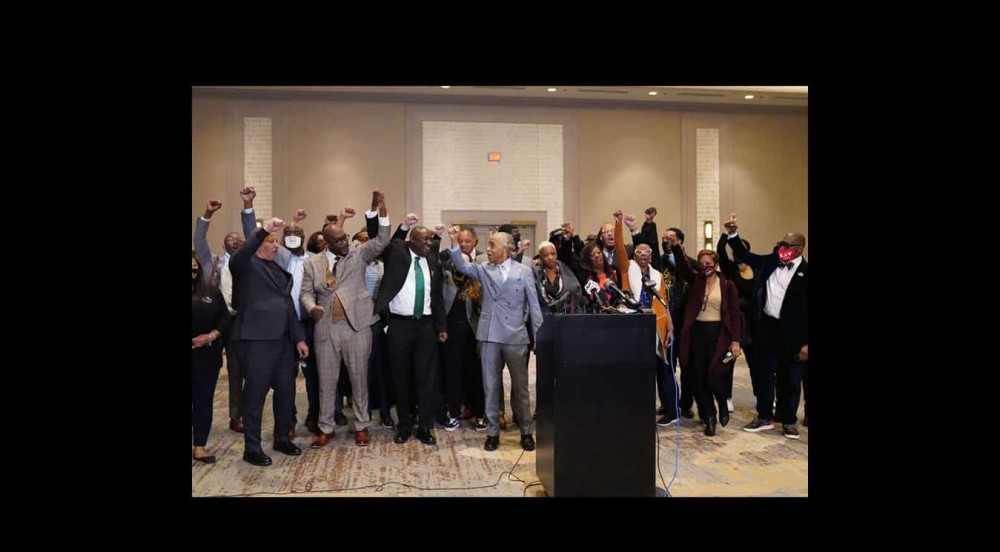This story was originally published April 28, 2021.
Activist Najee Ali shares what it was like to be on the ground during protests and with the Floyd family the evening of the conviction of disgraced police officer Derek Chauvin.
One emotion raked through my body as I sat inside the courthouse holding room listening to closing arguments in the trial of former Minneapolis police officer Derek Chauvin: I was nervous. The defense was intent on attempting to continue to blame George Floyd for his own murder. I thought to myself, "Black folks are the only people in the world blamed for their own victimization."
Later that day, I waited in a room a few feet away from my long-time friends and mentors, Reverend Jesse Jackson and Reverend Al Sharpton. My mind was on the number of criminal and civil cases these two iconic civil rights leaders had become involved with, particularly those connected to justice for victims of police killings. I also thought about how often the rulings were simply unjust. I spoke to members of the Floyd family, whose gazes were all fixed on the big screen television listening intensely to every word uttered in the court proceedings.
The Floyd family attorney Ben Crump sat at the front at a huge table, periodically offering the room a commentary on what was going to happen next. Then closing arguments came to a conclusion. The Judge had the jury sequestered as they began deliberations.
When I returned to my hotel room, I prayed. The truth is I did not know what to expect. The video of Chauvin’s tortutuous murder of Floyd, with his knee on his neck for over nine minutes, was strong and compelling. Then I thought about the not-guilty verdict of the four white LAPD officers in the video beating of Los Angeles motorist Rodney King in 1991. I thought about the 2014 video of Eric Garner being placed in a chokehold by New York police officers, and the last words he uttered, “I can’t breathe”, before he was killed. Those officers stood trial and were all exonerated.
All I could do was be optimistic that this time things would be different.
The afternoon I received a text alert a verdict had been reached I immediately returned to the courthouse. Floyd’s girlfriend Courtney Ross, 45, who had given emotional testimony during the trial, was outside awaiting the verdict. I joined her, giving her a hug of support and words of comfort. Within an hour cheers erupted outside the courthouse as the judge announced that jurors had found Chauvin, guilty on all three charges — second-degree murder, third-degree murder, and second-degree manslaughter — on their second day of deliberations.
I, along with everyone outside, was ecstatic. It is exceedingly rare to have a police officer charged with a crime against a civilian. It is even more difficult to obtain a criminal conviction. The conviction of Chauvin was a historic one. Black America has always had to place our faith and hopes in a judicial system that always seemed to fail us. We had finally received justice.
Still, one common theme was shared as I spoke to several other activists who were all celebrating the guilty verdict in Floyd’s case: This is only be the beginning. Why? There were hundreds more victims of police violence in Minnesota, and countless more around the world. That night I sent a pointed to text to my fellow activists, it read “We need to reopen these cases and get justice for the rest of these families."
A day after the verdict, U. S. Attorney General Merrick Garland announced that the Justice Department opened a civil investigation to determine whether the Minneapolis Police Department engages in a pattern or practice of unconstitutional, unlawful policing. The investigation is long overdue.
As many Black Americans celebrated our legal victory in the Floyd murder case that week I could not help but think of Daunte Wright, the 20-year-old unarmed African American male shot and killed during a traffic stop by Kim Potter, a white police officer. Potter resigned and is now facing criminal charges as well. We need to get to a point in this nation that police officers stop unjustly killing Black people. Our Black lives do matter. The jury in the Chauvin case spoke loud and clear.
Najee Ali is a civil rights activist and the Southern California Community Relations Ambassador for Operation HOPE, a nonprofit for-purpose organization working to disrupt poverty and empower inclusion for low and moderate-income youth and adults.













